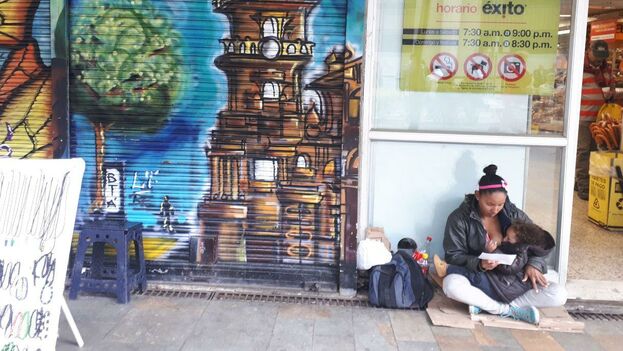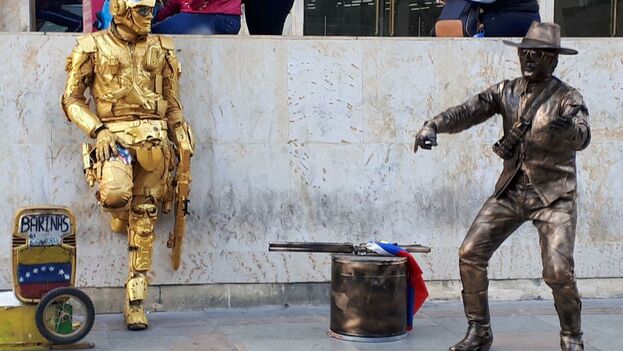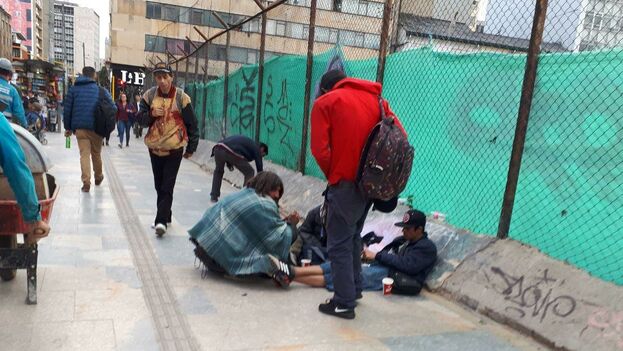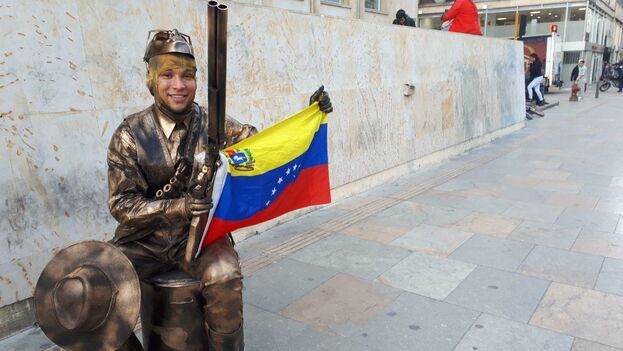
![]() 14ymedio, Yoani Sanchez, Bogota, 15 February 2020 – There are three of them and they are sitting on a wall in front of a restaurant in the Chapinero neighborhood. The girl is restless and the mother tries to keep her from walking into the busy avenue. Meanwhile, the father asks for money. He is about 20 years old and all the bones of his face are visible. “We come from Caracas, we arrived here last week,” says the young Venezuelan, who identifies himself as Andrés.
14ymedio, Yoani Sanchez, Bogota, 15 February 2020 – There are three of them and they are sitting on a wall in front of a restaurant in the Chapinero neighborhood. The girl is restless and the mother tries to keep her from walking into the busy avenue. Meanwhile, the father asks for money. He is about 20 years old and all the bones of his face are visible. “We come from Caracas, we arrived here last week,” says the young Venezuelan, who identifies himself as Andrés.
I start a conversation and just listening to my accent he pulls back, on guard. The few syllables I pronounce act as a threat to his ears. “Relax, I’m Cuban, I’m not a Castro supporter,” I say, to calm him, but the fear is in his eyes, opened wider than a second ago, in his nervous stutter, and in his grabbing of his belongings.
I sit down next to him to allay his suspicion and tell him it’s my fault, a heavy weight that I carry on my shoulders. “I understand what you are living through, we are responsible in some way,” I say. I keep talking and it eases the tension and he talks. “We left with what we had on, madre, our feet are still destroyed by the journey,” and he shows me his shoes with holes big enough to put his little finger through.
It’s noon and the Bogota street is a swarm of people leaving their offices for lunch. For most of those who pass by, these three Venezuelans are virtually invisible. The city is full of them, at every corner, at every traffic light and in every neighborhood. According to figures published by Migration Colombia last August, at that time there were 1,408,055 of these migrants in the country, an increase of 11% compared to the first quarter of 2019.
However, the numbers may be far from the reality because many migrants are in the country irregularly, or are in the process of legalizing their status. It is enough to travel the streets of the Colombian capital, approach the border towns or spend a few hours in some office where the paperwork is prepared to get an identity card, to realize the impressive scale of this exodus.

Outside a Carulla supermarket, Elmer, 16, sells empanadas and arepas. For two thousand Colombian pesos (about 60¢ US), he offers his merchandise warm and wrapped in napkins. “I came with my grandmother, my mother and my two sisters, but I am the only one in the family who can work now,” he says. “In Venezuela we left my other two brothers and my grandfather, so we have to send them money.”
Elmer dropped out of school more than three years ago, when the economic situation in his nation hit bottom. “All my friends left and in the end it was my turn,” he explains. He has the look of an old man who has seen the ups and downs of life, he speaks without hope and, every so often, checks the coins he has earned, polishes them and collects them in a small pile.
“On a bad day I make 50,000 Colombian pesos in this corner,” he says. That’s less than 15 dollars, a small fortune in his country, where shortages and inflation have turned money into a balloon that goes up and up to the stratosphere. But in Bogotá, Elmer and his family can barely survive with that, after the remittances they have to send home and the rent of a tiny apartment.
The family entered the country through the border city of Cúcuta. Elmer does not like to talk about his time in that border region, but only says “there, my older sister and my mother took charge.” It is not necessary to add anything else, the prostitution of Venezuelan women in that area has skyrocketed in recent years and in the brothels doctors, nurses, engineers and teachers take turns, due to the economic despair that has led them to sell their bodies.
A customer heading into the Carulla approaches Elmer to buy some empanadas. “Two meat and one cheese,” he specifies, and the young man’s hands, wrapped in plastic gloves, dip into a small pot. He is also wearing a facemask, which in these times of the coronavirus implies another meaning. “No, it’s that customers don’t like us to breathe on the merchandise,” he says.
Elmer’s younger sister is called Cinthia; she is a girl of about eight who appears past noon bringing more empanadas. She was born in March 2013, shortly before Hugo Chavez died, and of her country all she has left are some of her brother’s photos, some of the flavors still served in her family’s kitchen, and nostalgia. She already has some Colombian friends she met in public school.
When Elmer was born, Cuba was living high on the hog, supported by the Venezuelan subsidy. Those were the years when the Battle of Ideas, the Energy Revolution and all the ideological excesses that Havana could afford were at their peak expression. Home appliances were distributed at preferential prices, public acts of revolutionary vindication were organized every week and ideological propaganda reached amazing levels.
So Elmer’s drama is partly a consequence of our waste and folly. On an island that has always had continental aspirations, this propensity to suck the resources of great powers became an official practice in the last half century. Some even point to Cuba as among the causes of the Soviet Union’s implosion, but what does seems certain is that we are one of the great reasons for the Venezuelan debacle.
The year that Elmer’s younger sister Cinthia arrived in this world, the bubble had begun to burst. Chávez was ill, his popularity in a tailspin, the Plaza of the Revolution increasingly mentioned as the cause of a good part of Venezuela’s problems and life in Caracas was very uncertain, dangerous and difficult. In Cuba, most of us did not even realize the drama we had caused in one of the richest nations in Latin America.

It is tremendously hot in Bogotá. I look at both siblings, buy an empanada and eat it near the steaming pot, along with a low-sugar lemonade Elmer, who is almost ten years younger than my son, has prepared for me himself.
Uber was kicked out of Colombia on January 31, so when I can’t wait for public transportation I must appeal to Beat, a mobile application that has partly replaced the American giant. I enter the address, request a car and Joaquín arrives, a Colombian with a good-natured smile who splashes the conversation throughout the trip with jargon like huevón (“bro” and also “dickhead”), marica (faggot) and gonorrea. I do not flinch, I know that in Bogotá these are phrases almost of love.
Joaquin works more than twelve hours every day. I get into the vehicle by the door next to the driver, because they prefer it for safety reasons, and then he starts complaining about the extremes of the weather, ranging from 1 degree Celsius in the morning to more than 25 at noon. “You have to be like an onion and take off your clothes as the day progresses,” he explains. The vehicle moves with a desperate slowness, about 10 or 15 kilometers per hour because of the trancones (traffic jams). The red light catches us and a young man throws himself on the windshield and announces, with a Venezuelan accent, his services before starting to spray a liquid on the glass.
“Some come here to work but others do not,” Joaquin tells me while pointing to the young man. Then start he starts enumerating the issues against migrants that could be heard anywhere in the world. That “they work for less and displace local workers”; that “they are not like the people here and do not know how to behave”; that “they are everywhere and this is already unbearable”; that “we are not prepared for the arrival of so many people”… I listen in silence and when he pauses, I take advantage of it and say:” Nobody leaves their country with a smile.”
Joaquin looks at me as if he had just discovered me. He inspects my face and takes the opportunity to add: “All emigration is full of pain.” The young man finishes drying the windshield, the traffic light turns green and Joaquin leaves him some coins before stepping on the accelerator and heading down 70th Street. “And where are you from, who knows so much about this?” he asks me. “I’m from the place where part of the problem began,” I say and shut up.
“Take care, little lady,” says Joaquin, as I get out of the car. “Not everyone is good in this city, watch out for the venocos, he says, in an allusion to Venezuelans, and in that last sentence I notice – underneath it – a certain Argentine accent. Joaquin who seemed more Colombian than the poet José Asunción Silva – whose face is on the 5,000-peso bill – turns out not to be from here either and has come from another place, like me, like Elmer and Cinthia… like Andrés.
I’m at the Colombian Migration office on 100th Street. The line starts early. There is everything: Europeans, Americans, South Americans, but especially many Venezuelans. A guard at the entrance listens to each case and indicates which line to follow once inside the place. In front of a machine with a touch screen, several migrants gather.
Some will be redirected to the top floor, to a ticket office on the right hand side, or rejected because they still do not have all the requirements to request an identity card. The Venezuelan Marcia and her two children manage to move to the upper floor where they take fingerprints, take some photos and tell them that, in about a week their identification card will be ready. Outside, some friends who are waiting for them hug them as if they have been born again.

“In silence I have suffered so many sorrows / because my soul is so good and I cannot control it,” sings Vanessa on the corner; another Venezuelan, 22. She comes from the state of Zulia. Every morning she goes out to raise some money with her cousin Juan Carlos. They carry a huge wireless speaker and stand on a corner of Bogotá’s Carrera 11*. “If I have never given motives / I don’t know selfishness / and I do no one any wrong,” the speaker roars.
The vehicles stop with the red light, Vanessa steps up her singing, which mimics the interpretation of Reynaldo de Armas, also known by the nickname Cardinal Sabanero. The heat tops 80 degrees and the young woman wears leather pants and wields a microphone with the mastery of someone who is on a glamorous stage. Some coins fall into the hat under her feet.
“If this is the life / the one that marks our way / the way we must travel / for bad or for good / I must take this route / and we are going to follow it / even if we lose, she sings, and after her emotional performance she pauses. I approach her and introduce myself, but I try to imitate the local accent because I don’t want to scare her. “Cuban, right?” she snaps as soon as she hears me. I just shake my head, what else can I do.
What could I say to her? That she is on that corner repeating the same song hundreds of times, to a large extent because my country swallowed up the resources of hers, because we exported a failed model to them, one that has condemned our Island to begging and Venezuela, practically, to dismemberment. But Vanessa is not interested in my apologies. “I’m still not resigned / let me keep fighting / my desire is to win,” she begins to sing as soon as she sees the traffic light change color.
*Translator’s note: In Bogota’s street system calles run east-west and carreras run north-south.
_________________
COLLABORATE WITH OUR WORK: The 14ymedio team is committed to practicing serious journalism that reflects Cuba’s reality in all its depth. Thank you for joining us on this long journey. We invite you to continue supporting us by becoming a member of 14ymedio now. Together we can continue transforming journalism in Cuba.
